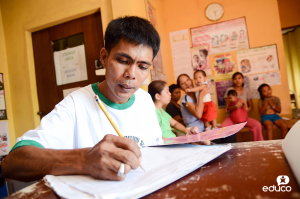Rey Lofamia, 38 and a father of five, is the current president of the Federation of Barangay Nutrition Scholar (BNS) in their municipality. He plays an important role in promoting and implementing nutrition programs in his village level since 2008.
“I did not have to pay for the things that I learned from the training I got as a BNS. Things that I learned about nutrition and about children,” he explains. He only completed his secondary education and started working since then. He started volunteering after he was offered to take on the responsibility since the previous BNS found employment with the LGU.
Educo-Philippines has been supporting local nutrition programs through its Nutrition Project that aims at strengthening local nutrition public structures. The project is supplemented by capacitating the nutrition workers about the World Health Organization-Child Growth Standards (WHO-CGS) training and provision of weighing equipment and measuring tools. Starting 2012, the project has covered 11 municipalities and 122 barangays in Sorsogon, Albay and Camarines Sur.
Rey is one of the recipients of the training program supported through this project. Through the strengthening of the nutrition council activity, he has been able to contribute to his community through identification nutrition-related activities and provision of reliable data to the Barangay Nutrition Council (BNC), where he is a member.
Working as a BNS is not a bed of roses. Over the years he has experienced increase and decrease in budget due to changing priorities. For 2016, he was allotted a budget of Php10,000 (€ 193) in support to programmed activities including the conduct of mother classes, wherein the “Pabasa sa Nutrisyon” is integrated.
In his village of Abucay, he caters to the needs of 612 households with about 300 less than six year-olds. Malnutrition prevalence in this community is about 17%. Based on his observation, reasons for malnutrition for this age group include early introduction of complementary food and non-exclusive breastfeeding until six months.
He also mentioned that most infants are of normal weight-and-height to age ratio, which can be attributed to regular pre-natal check-ups and counseling. He observed that children in their village start becoming malnourished between the age of 1.5 to 2, when the children start eating complementary food. Malnutrition is even higher for 6-11 year-old school children.
Since BNSs only receive minimal living allowance, he is also doing construction jobs to support his family. Before becoming a BNS, he has been away from his family for six years, working in various construction companies in the metropolis.
When asked what he likes most being a BNS, “I get to stay with my family. Although I still get some jobs outside of Abucay, the longest so far was only two months.”
At present, he is stationed in the barangay health center while their barangay hall is being renovated. He is planning on lobbying to the barangay council to give him a Nutrition Office in the old barangay hall.
 “I need the space for safekeeping for reports, tools and equipment. It will also be more convenient for the mothers and children. One has to have the heart to stay long as a BNS,” he mused.
“I need the space for safekeeping for reports, tools and equipment. It will also be more convenient for the mothers and children. One has to have the heart to stay long as a BNS,” he mused.
Further, Rey is training two other village members, whom he sees will continue the work and to ensure that whatever he learns are also passed on within their village. Although improvements still need to be done, initial knowledge and capacity have already been given. Each child is being provided with the quality health and nutrition services needed, albeit slowly.
#Story by Mariella, MEL Specialist





